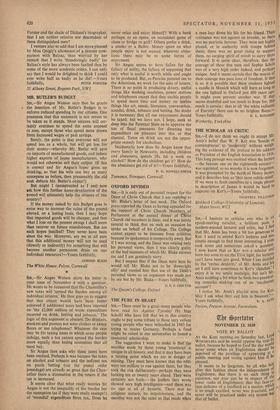Sm,—Sir Angus Watson starts his letter in your issue of
November 4 with a question. He wants to be reassured that the Chancellor's new taxes will 'spread the burden among all individual citizens,' He then goes on to suggett that this object would have been better achieved if additional taxes had been imposed on 'the £2,000 million of waste expenditure incurred on, drink, betting and tobacco.' The logic of this argument is obscure. Do drinkers, smokers and punters not wear clothes or sweep floors or use telephones? Whatever the case may be for taxing items in which some people indulge, such a tax cannot spread the burden more equally than taxing necessities that all must buy.
Sir Angus then asks why these items have been omitted. Perhaps it was because the taxes on alcohol and tobacco and the indirect tax. on pools betting (via the postal order poundage) are already so great that the Chan- cellor fears a diminution in the return if the tax is increased.
It seems clear that what really worries Sir Angus is not the inequality of the burden but the exemption (as if they were really exempt!) of 'wasteful' expenditure from tax. Does he
never relax and enjoy himself? With a book perhaps, or an opera, an occasional game of chess or bridge or golf? Others prefer a drink, a smoke or a flutter. Money spent on what people enjoy is not wasted, whatever objec- tions there may be to some forms of enjoyment.
Sir Angus seems to have fallen for the fallacy of utility, the fallacy of supposing that only what is useful is worth while and ought to be produced. But, as Pericles pointed out to the Athenians, we work for the sake of leisure. There is no point in producing dreary, useful things like washing machines, power stations and telephones except that they enable people to spend more time and money on useless things like art, music, literature, conversation, scandal, drink, tobacco and betting. No doubt it is necessary that all our enjoyments should be taxed; but we have not, I hope, sunk so deep into the Paternal State as to approve the use of fiscal measures for directing our expenditure on pleasure into this or that channel. Taxes on drink are not the appro- priate remedy for alcoholism.
Incidentally how does Sir Angus know that every family in Newcastle, including children and abstainers, spends 28s. 6d. a week on alcohol? How do the children get it? How do the abstainers get rid of it?—Yours faithfully, P. H. NOWELL-SMITH Trenance, Newquay, Cornwall


































 Previous page
Previous page